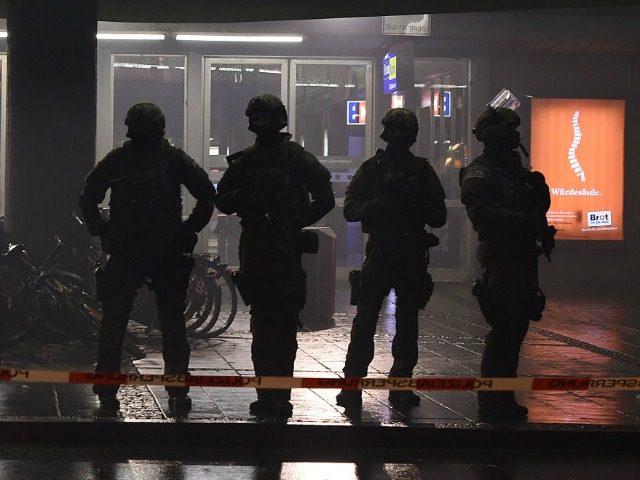While the Interior Ministry denies even the existence of no-go zones in Germany, officers report that Lebanese crime clans have made neighbourhoods across North Rhine-Westphalia almost impossible to police.
At around 10 o’clock last Tuesday evening, police were called by concerned residents who alerted them to a mass brawl taking place outside a family restaurant in Erkrath-Hochdahl.
Around 150 members of a Lebanese extended family and about two dozen bikers from a Hells Angels chapter, many of them also with a Lebanese background, were fighting one another with fists and broom handles.
A significant deployment of police arrived at the scene after the bikers had eventually barricaded themselves in a nearby pub. More than 100 officers were involved in trying to settle the dispute between the two groups and a police helicopter monitored the situation from the air, all of which lasted until the early hours of the morning.
Police report that the two groups have clashed before, beating each other with sticks and batons in another fight in August which required more than 100 police officers to bring the situation under control.
The two factions claim their confrontation in August was about an argument over a parking lot but police believe the sides’ enmity is part of a bigger dispute between the two clans.
“We do not know the true background. It is certainly not a biker war. Rather, we believe that this is a dispute between two clans, with the connections the biker group has,” Mettmann District police spokesman Ulrich Löhe said.
The Cologne City Gazette notes that the confrontation would likely reignite the ongoing debate over the politically sensitive issue of no-go areas. Christian Democratic Union (CDU) interior expert Gregor Golland recently warned: “In North Rhine-Westphalia (NRW) there are districts where clans have taken over the streets. After sunset, people and the authorities no longer dare leave the house.”
Asserting that areas of Germany are spiralling into lawlessness, Mr. Golland said: “We must be careful that these districts not slip completely.”
The Gazette reports that gangs and clans have taken control in neighbourhoods across the state’s metropolises including Duisburg, Gelsenkirchen, Essen, Cologne, Dortmund, Aachen, and Bochum. Violence against the police has risen as much as 50 per cent in many of these areas.
In the Duisberg district of Marxloh last summer, a female police officer was heavily beaten by a mob from a Lebanese clan while recording a traffic accident. Her colleague was only able to restrain the attackers by drawing his handgun.
In December last year, the police chief of Gelsenkirchen met with leaders of the Lebanese clans after months of violence. The men made clear that they weren’t wanting to negotiate peaceful coexistence with the force, telling him the police “will not win a war with the Lebanese, because we are too many.”
Members of the “Family Union” clan were unimpressed when the police chief announced the force planned to send more officers to “problem areas” in the town.
According to an internal police report, the men said: “The country has no money to be using so many policemen to seek confrontation with the Lebanese.”
Germany’s Home Office completely denies the existence of no-go areas. Interior Minister Ralf Jäger said: “In North Rhine-Westphalia there are no lawless areas. The NRW police drive their police cars down every street in every district.”
Interior expert Golland said he considers the Interior Minister’s statement “window dressing”. “People that address the problems are denounced as traitors”. Similarly, the Free Democratic Party’s interior expert Marc Lürbke told the Gazette: “Certain districts are now associated with significant risks for state officials.”
The staffing situation of NRW’s police force remains difficult. Responding to a question about how the number of cases of pickpocketing in Cologne is skyrocketing, the Interior Ministry’s department head said policing would need to be “thinned out” in rural areas. The result, Wolfgang Düren admitted, is that police can now only afford to give “a minimum level of protection for the population”.
The police union in the state (GdP) is viewing the situation in no-go zones with concern. GdP board member Volker Husz said: “The problem districts have significantly worsened in recent years.
“Officials are insulted and threatened while they record traffic accidents, ambulance workers are attacked. We cannot let [this behaviour] pass.”

COMMENTS
Please let us know if you're having issues with commenting.